Discussions about atonement for the enslavement of Black Americans have a long history in the United States, and efforts toward reparations for slavery and racial discrimination have moved forward in some places in recent years. In 2021, Evanston, Illinois, became the first U.S. city to create a reparations plan for its Black residents, and California that year set up the nation’s first state-level reparations task force. Earlier this year, Harvard University created a $100 million “Legacy of Slavery” fund to allow scholars and students to examine the university’s connections to slavery.
Americans view the prospect of reparations mostly negatively, a 2021 Pew Research Center survey found. Three-in-ten U.S. adults say descendants of people enslaved in the U.S. should be repaid in some way, such as given land or money. About seven-in-ten (68%) say these descendants should not be repaid.
This analysis examines differences in Americans’ views about reparations for slavery in the country. It is part of a larger project that aims to understand Americans’ views of racial inequity and social change in the United States.
For this analysis, we surveyed 3,912 Black U.S. adults from Oct. 4-17, 2021. Black U.S. adults include those who are single-race, non-Hispanic Black Americans; multiracial, non-Hispanic Black Americans; and adults who indicate they are Black and Hispanic. The survey includes 1,025 Black adults on Pew Research Center’s American Trends Panel (ATP) and 2,887 Black adults on Ipsos’ KnowledgePanel. Respondents on both panels are recruited through national, random sampling of residential addresses. We surveyed 6,513 U.S. adults on the ATP for the general population portion of the survey. White and Asian respondents include those who report being only one race and are not Hispanic. Hispanics are of any race.
Recruiting panelists by phone or mail ensures that nearly all U.S. adults have a chance of selection. This gives us confidence that any sample can represent the whole population (see our Methods 101 explainer on random sampling).
Here are the questions used for the survey, along with responses, and its methodology.
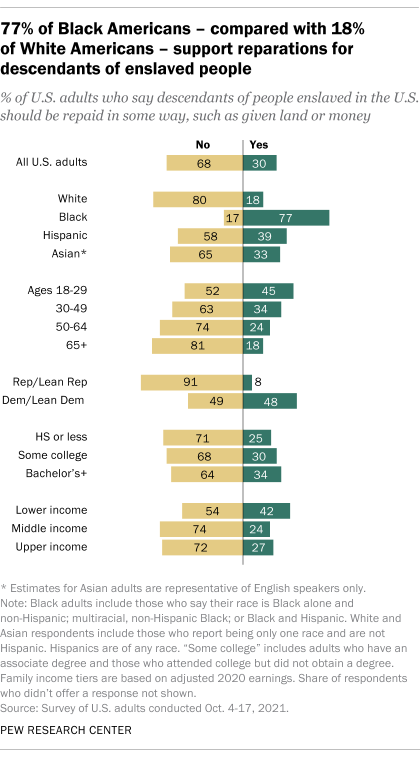
Views of reparations for slavery vary widely by race and ethnicity, especially between Black and White Americans. Around three-quarters of Black adults (77%) say the descendants of people enslaved in the U.S. should be repaid in some way, while 18% of White Americans say the same.
There are also notable differences by partisan affiliation. Among Democrats and Democratic-leaning independents, views are split: 48% say descendants of enslaved people should be repaid in some way, while 49% say they shouldn’t be repaid. By comparison, only 8% of Republicans and GOP leaners say these descendants should be repaid in some way, and 91% say they should not.
When it comes to age, younger adults are more likely than older ones to say the descendants of enslaved people should be repaid: 45% of adults under 30 take this view, compared with 18% of adults 65 and older.
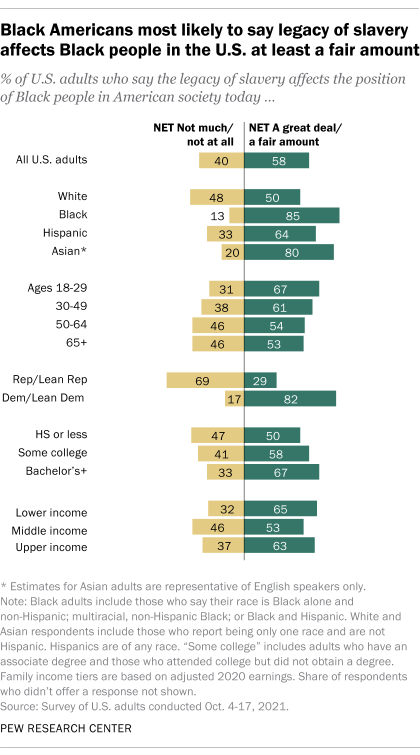
When Americans are asked about the legacy of slavery’s effect on Black people today, 58% of the overall public says this affects the position of Black people in American society at least a fair amount, with 28% saying it affects them a great deal. Four-in-ten U.S. adults say the legacy of slavery has not much or not at all affected the position of Black Americans in the country today.
As with views of reparations, racial and ethnic differences on this question are notable. Black Americans (85%) are more likely than Hispanic (64%) and White (50%) Americans to say the legacy of slavery affects the position of Black people in the U.S. a fair amount or a great deal.
The partisan gap on this question is also wide. More than eight-in-ten Democrats (82%) say the legacy of slavery affects Black people in the U.S. a fair amount or a great deal, more than 50 percentage points greater than the share of Republicans who say this (29%).
Black Americans are much more likely to identify with or lean toward the Democratic Party; only about one-in-ten Black voters identify with or lean toward the Republican Party. As of 2020, White voters are slightly more evenly split, but the GOP has an advantage (53% to 42%).
Some racial, ethnic and partisan differences over who bears responsibility for reparations, what form they should take
In the Center’s 2021 survey, the 30% of Americans who favored reparations were also asked about the institutions and individuals who bear responsibility for repayment. They were presented with four options: the U.S. federal government, businesses and banks that profited from slavery, colleges and universities that benefited from slavery, and descendants of families who engaged in the slave trade.
Three-quarters of reparations supporters say the federal government has all or most of the responsibility to repay descendants of enslaved people. A smaller share, though still a majority, say businesses and banks that profited from slavery (65%) have all or most of the responsibility. Fewer say the same about colleges and universities that benefited from slavery (53%) and descendants of families who engaged in the slave trade (44%).
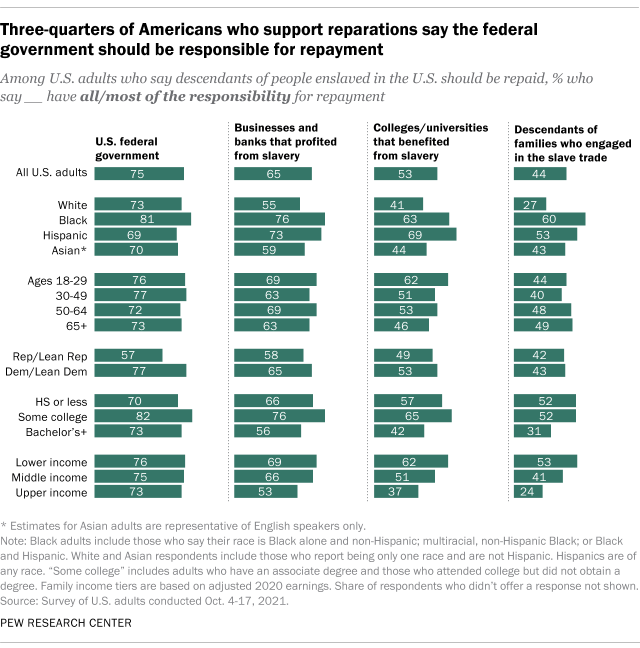
Reparations supporters were also asked how helpful the following forms of repayment would be: educational scholarships, financial assistance for starting or improving a business, financial assistance for buying or remodeling a home, and cash payments. These adults are most likely to say educational scholarships would be very or extremely helpful (82%), followed by financial assistance with businesses (75%), financial assistance with home buying or remodeling (73%) and cash payments (57%).
There are some racial, ethnic and partisan differences in Americans’ views of both the institutions that would be responsible for reparations, as well as the specific forms that reparations might take.
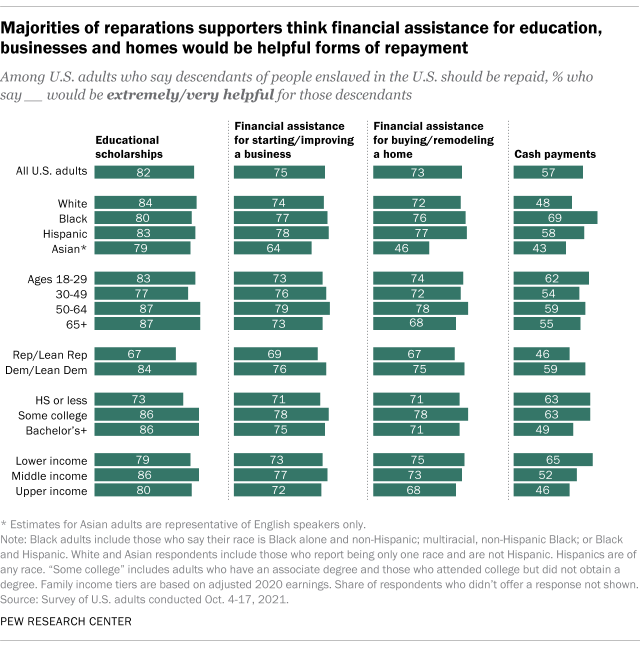
For example, more than six-in-ten Black and Hispanic reparations supporters (63% and 69%, respectively) say colleges and universities that benefited from slavery bear all or most of the responsibility for repaying descendants of enslaved people. By comparison, White and Asian American supporters of reparations are notably less likely to hold this view (41% and 44%, respectively).
Among those who support reparations, Democrats are 20 points more likely than Republicans to say the federal government bears all or most of the responsibility for repayment (77% vs. 57%).
When it comes to various forms of repayment, majorities of Black American reparations supporters say all four forms of assistance would be extremely or very helpful, and those in other racial and ethnic groups largely agree. Americans in each racial and ethnic group are least likely to say cash payments would be helpful.
Low expectations for the likelihood of reparations
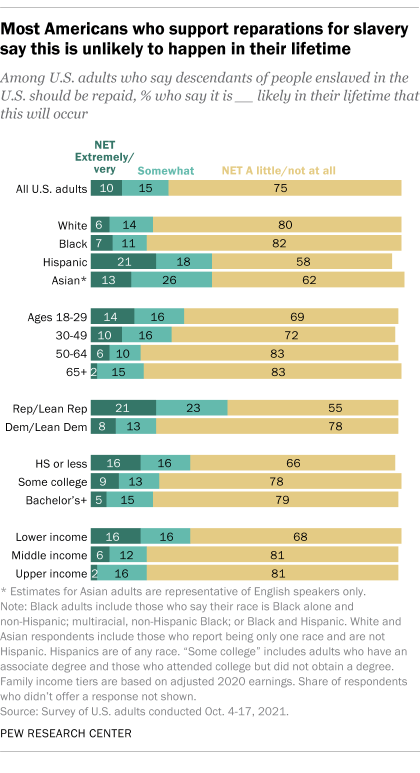
Those who support reparations to descendants of people enslaved in the U.S. were also asked whether repayment – of any type or from any source – would happen in their lifetime. Most supporters of the idea say this is not likely.
Overall, three-quarters of U.S. adults who support repayment to descendants of enslaved people say it is a little or not at all likely that this will happen in their lifetime. Only 10% say it is extremely or very likely.
There are a few demographic differences among respondents on this question, too. Hispanic (21%) and Asian American (13%) reparations supporters are more likely than their White (6%) or Black (7%) counterparts to say it’s extremely or very likely that these descendants will be repaid in their lifetime. And supporters ages 18 to 49 (12%) are more likely than those 50 and older (5%) to say it’s extremely or very likely that these descendants will be repaid in their lifetime.
Note: Here are the questions used for the survey, along with responses, and its methodology.
